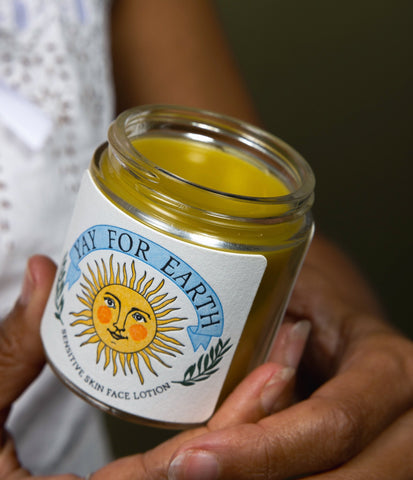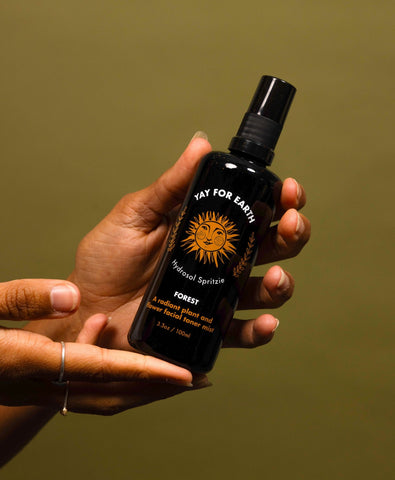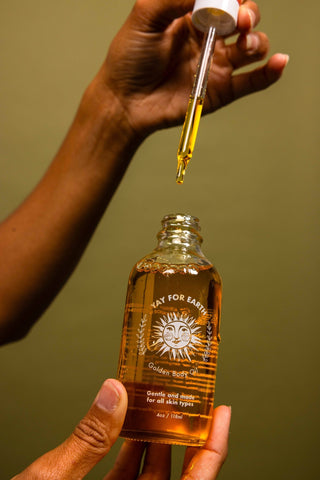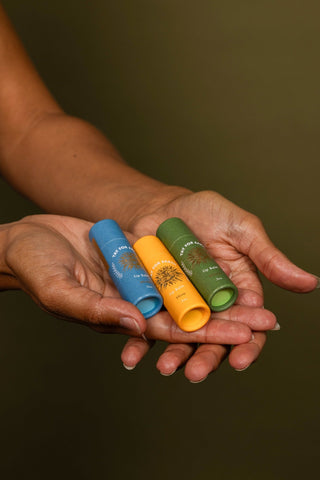You're halfway through a January hike when you notice it—that familiar tightness pulling at the corner of your mouth. By the time you're back at your car, there's a split. Nothing major, just enough to remind you it's there every time you talk, eat, or smile for the next three days. You grab whatever's in the gas station checkout line on the way home, slather it on, and wonder why this keeps happening.
Here's what most guys don't realize: your lips are taking a beating every single day, and most of what passes for "lip care" in the men's grooming aisle is actually making things worse. Between harsh weather, constant talking, eating, drinking coffee, and the fact that lip skin completely replaces itself every two weeks, your lips need legitimate protection—not just something that feels slick for twenty minutes.
The difference between lips that crack, peel, and bleed versus lips that stay comfortable all winter comes down to understanding what's actually happening to your skin and choosing products that address real problems instead of covering them up temporarily. This isn't about vanity or adding another unnecessary step to your routine. This is about solving a problem that affects how you feel every single day.
The Quick Answer (If You're In a Hurry)
If you only remember three things about lip care:
Your lips have zero natural protection.
No oil glands means you need external barrier protection from natural waxes (especially beeswax) combined with nourishing butters and oils—not petroleum jelly that just sits on the surface.
Most drugstore lip balms create a cycle of dependence.
If you're reapplying constantly and still dealing with dryness, switch to products with organic plant oils, shea butter, cocoa butter, and beeswax from small-batch producers who prioritize ingredient quality over shelf life.
Apply preventatively, not reactively.
Put it on before going outside, after eating, and before bed—not just when your lips already feel dry. Quality products should last hours, not minutes.
Now here's why this matters and how to choose the right products.
 Why Men's Lips Are Under Constant Attack
Why Men's Lips Are Under Constant Attack
Your lips are fundamentally different from the rest of your skin, and those differences create specific vulnerabilities.
No Protection System
Regular skin has oil glands that continuously produce sebum, creating a natural protective layer. Your lips have essentially zero oil glands. That means no natural moisture barrier, no self-repair mechanism, and no built-in defense. It's like working outside without weatherproofing—exposure adds up quickly, and the damage is cumulative.
Constant Mechanical Stress
Your lips are in almost constant motion—talking, eating, drinking, yawning, smiling, mouth breathing during workouts. Each movement creates micro-stress on already vulnerable skin. Most guys unconsciously lick their lips when they feel dry, which makes things worse.
Environmental Exposure
Cold air, dry indoor heating, air conditioning, direct sun exposure, wind—your lips face relentless environmental challenges. For guys who work outside or pursue outdoor hobbies, this exposure intensifies. Construction workers, landscapers, cyclists, runners, skiers—if you're spending significant time outside, your lips face constant damage.
The Hydration Problem
Your lips lack the protective outer layer (stratum corneum) that regular skin has, so water evaporates directly from the underlying tissue. When humidity drops in winter or air-conditioned spaces, this moisture loss accelerates. When your body runs low on water, it prioritizes vital organs—your lips are way down the list.
Why Most Lip Balms Don't Work
Most guys grab whatever's cheapest or most familiar from the convenience store, use it religiously, and still end up with chronically chapped lips. The problem isn't that you're not using lip balm—it's that you're using the wrong kind.
The Temporary Relief Cycle
Many popular lip balms create what dermatologists call "lip balm addiction," though it's not true addiction. You apply the product, it feels great for thirty minutes, then your lips feel even drier. So you apply more. By day's end, you've used it a dozen times and your lips still feel terrible.
This is a direct result of ingredients that provide immediate relief without helping your lips repair themselves. Some products actively dry out your lips while making them temporarily feel better.
Ingredients That Work Against You
Menthol and camphor create a cooling sensation but are actually mild irritants. Petroleum jelly sits on top without penetrating—it's not nourishing the tissue, just creating a temporary barrier that wears off quickly. Synthetic fragrances and flavors trigger sensitivity reactions you might not recognize. That slight tingling or subtle burning? Those are signs your lips are reacting to something in the formula.
The Medicated Balm Misconception
Products marketed as "medicated" contain phenol or similar compounds for immediate pain relief. They work for acute problems, but daily use can thin sensitive lip tissue over time. They're designed for short-term relief of severe problems, not daily maintenance.

What Actually Works: The Science of Lip Protection
Effective lip care creates a protective barrier that lasts, delivers actual nutrition to the tissue, and supports your lips' natural repair processes. Products that do all three keep your lips comfortable year-round.
Barrier Function That Lasts
Natural waxes, particularly beeswax, create a breathable barrier that protects against environmental damage while allowing normal function. Quality beeswax from responsible beekeepers contains natural compounds that provide mild antibacterial properties while helping other beneficial ingredients stay in contact with your lips longer.
Real Nutrition vs. Temporary Coating
Your lips need actual nutrients. Plant-based oils rich in omega fatty acids provide the building blocks for healthy lip tissue. Oils like jojoba, organic olive oil, and sacha inchi deliver nutrients your lips can actually use. Shea butter and cocoa butter add vitamins, antioxidants, and fatty acids that support skin repair.
Support for Natural Processes
Your lips regenerate completely every two weeks. The goal isn't dependence on products—it's protecting them while they maintain and repair themselves. The best lip balms are ones you eventually need less often because your lips are healthier.
SHOP THE BEST LIP BALM FOR MEN
Choosing Lip Balm That Actually Solves Problems
Selecting effective lip balm means understanding what you actually need based on your specific situation rather than just grabbing whatever's convenient.
For Guys Who Work Outside
If you're spending significant time exposed to weather—construction, landscaping, outdoor sports, or just a long commute on a motorcycle—you need maximum protection with staying power. Look for formulations with substantial beeswax content combined with deeply nourishing butters. Thicker, more substantial formulations might feel like overkill initially, but they're exactly what you need when facing hours of wind and sun exposure.
For Active Lifestyles
Runners, cyclists, climbers, and gym rats need lip protection that stays put during physical activity without feeling heavy or interfering with breathing. You're probably breathing through your mouth more than you realize during workouts, which dramatically increases moisture loss from your lips.
Products with balanced viscosity work best—thick enough to stay put but not so heavy that you're constantly aware of them. Natural oils absorb well and won't leave that sticky feeling that drives you crazy mid-workout. Some guys prefer applying before activity and then keeping a lighter formula in the gym bag for reapplication.
For Dry Climate or Winter Exposure
If you live where humidity regularly drops below 30%, or if you're facing a serious winter, you need intensive moisture with serious barrier protection. Rich formulations with multiple butter sources—shea butter, cocoa butter, and beeswax combinations—provide both immediate relief and long-term protection. Don't underestimate indoor heating either; running a furnace all winter can drop indoor humidity to desert levels.
For Sensitive Skin
Some guys react to even mild ingredients. Fragrances, essential oils, synthetic additives—any can trigger reactions. Unscented options with minimal organic base ingredients work best. Products focused on sensitive skin—using organic olive oil, local beeswax, organic jojoba, sacha inchi oil, shea butter, and cocoa butter without synthetic additions—deliver results without triggering reactions.
For Daily Maintenance
If you're not facing extreme conditions but want to avoid the whole chapped lip situation, straightforward daily protection with good ingredients handles most situations. You want something that fits in your pocket, doesn't melt into a useless liquid in warm weather, and provides genuine protection rather than just temporary relief.
Natural formulations in paper tube packaging solve the pocket-melting problem while being more environmentally responsible than plastic. They typically contain balanced ratios of protection and nutrition—not as intensive as winter-specific products but more substantial than those tiny tubes of flavored wax that barely do anything.

Application Strategy That Actually Works
Having good lip balm means nothing if you're not using it effectively.
Timing Matters More Than Frequency
Apply before your lips feel dry. Preventative application—before exposure rather than after symptoms—keeps you ahead of problems. Apply before heading outside, after eating or drinking, and before bed for overnight healing.
Application Technique
Start with clean, dry lips. Apply more than you think you need using smooth, even coverage. Don't rub aggressively—firm but gentle pressure works best. Pay attention to the corners of your mouth and the border between your lips and regular skin. These vulnerable zones often get skipped.
The Layering Question
For extreme conditions—multi-day backpacking, winter mountaineering, extended outdoor work—layer different products. Apply a lighter oil-based product first, let it absorb, then seal with heavier wax-based barrier. For normal daily use, single-product application is sufficient.
SHOP THE BEST LIP BALM FOR MEN
Debunking Common Lip Care Myths
"Drinking More Water Will Fix Everything"
Proper hydration helps, but won't solve chapped lips alone. Your lips lose moisture directly to the environment regardless of hydration status. You need both adequate water intake and external protection.
"Lip Balm Is Just for Winter"
UV damage to lips is real and cumulative, breaking down tissue and creating premature aging and cancer risk. Summer protection matters just as much—you're just defending against different threats.
"Natural Ingredients Don't Work as Well"
Properly formulated natural products often outperform synthetic alternatives because they work with your skin's biology. Quality natural ingredients like organic olive oil, sustainably sourced beeswax, and organic shea butter provide both immediate relief and long-term benefits.
"Expensive Lip Balm Is Just Marketing"
Truly organic ingredients from regenerative farms, small-batch production with quality control, and sustainable packaging all cost more than industrial alternatives. When comparing a $2 drugstore balm to a $16 small-producer product, you're paying for fundamentally different ingredients and production methods.
"Lip Balm Addiction Is Real"
The constant reapplication cycle isn't addiction—it's a sign you're using products that don't address the underlying problem. Switch to formulations that provide genuine barrier protection and nutrition, and your lips will need less intervention over time, not more.
When Your Lips Signal Bigger Problems
Sometimes chronically chapped lips indicate issues beyond environmental protection.
Nutritional Deficiencies
Persistent problems despite proper protection can indicate deficiencies in B vitamins, iron, or zinc. If you're eating a restricted diet or have absorption issues, your lips might show it first.
Allergic Reactions
Contact dermatitis from dental products, foods, or skincare ingredients can masquerade as chronic chapping. If multiple lip balms haven't helped, consider whether you're reacting to toothpaste, mouthwash, or other oral care products.
Medical Conditions
Some autoimmune conditions, inflammatory diseases, and medications cause chronic lip problems that won't respond to typical treatments. Severe, persistent chapping with other symptoms like lesions or discoloration warrants evaluation by a healthcare provider.
Behavioral Factors
Chronic lip licking, mouth breathing during sleep, and nervous habits create constant irritation that even quality lip balm can't fully overcome. Mouth breathing during sleep is particularly damaging and worth addressing for both lip health and overall sleep quality.
Building a Sustainable Lip Care Approach
Long-term lip health comes from consistent habits rather than emergency interventions.
Make It Automatic
Keep lip balm where you'll use it: car, desk, nightstand, gym bag, jacket pocket. The best product is the one you actually use consistently.
Seasonal Adjustments
Your lips' needs change with seasons. Use heavier protection during harsh winter or blazing summer, lighter formulations in moderate conditions.
Quality Over Convenience
The gas station impulse buy gets you through a crisis, but investing in genuinely effective products prevents that crisis. Products made with organic ingredients from regenerative farms, packaged in compostable materials, and formulated with actual nutrition cost more initially but solve the problem long-term.
Pay Attention to Results
If you're using a product consistently and still dealing with chronic dryness, cracking, or irritation, it's not working. Be willing to change approaches. Good lip care should make your lips gradually healthier and less dependent on products.
The Ingredient Quality Question
Not all formulations are equal. Ingredients from regenerative farming contain higher concentrations of beneficial compounds than conventional alternatives. Organic olive oil from dedicated producers delivers more antioxidants. Local beeswax from beekeepers who prioritize bee health contains more natural beneficial compounds.
Cold processing preserves heat-sensitive compounds that industrial processing destroys. Small-batch production allows better quality control and fresher products. Companies that list ingredient sources, name their farmers, and explain sourcing choices demonstrate real confidence in their formulations. The most effective lip balms have surprisingly short ingredient lists—when products use just a handful of truly excellent ingredients, each one is optimized for quality.
Understanding the fundamentals of lip care—why your lips need protection, what works, and how to choose and use quality products—puts you ahead of most guys who just grab whatever's convenient. Now let's address the specific questions that come up most often.
Frequently Asked Questions
Why do my lips still get chapped even when I use lip balm regularly?
You're using a product that only provides temporary surface relief. Switch to products with substantial natural butter and oil content (shea butter, cocoa butter, organic plant oils) rather than petroleum-based formulations. Also check your hydration levels, eliminate lip licking habits, and ensure you're not reacting to ingredients in your toothpaste or other oral care products.
Is there really a difference between men's and women's lip balm?
Functionally, no. Lips are lips regardless of gender. The distinction is mostly marketing and scent preferences. Some "men's" products emphasize lack of shine or use woody/minty scents, while products marketed to women might have fruity flavors or add tint. What matters is ingredient quality and formulation effectiveness, not the target demographic on the package. Don't avoid something that works just because it's not explicitly marketed to guys.
How often should I actually be applying lip balm?
Every few hours for prevention—before going outside, after eating, and before bed. With quality products, you shouldn't need constant reapplication every thirty minutes. If you're applying more than six or seven times daily and still dealing with dryness, your product isn't working. The key is preventative application rather than waiting for symptoms.
Can I use the same product year-round or do I need different ones for different seasons?
Yes, most guys can use the same quality product year-round by adjusting application frequency and amount. Apply more generously and frequently in winter or dry climates, lighter in moderate conditions. If you face truly extreme conditions—harsh winters or very dry desert climates—having a more intensive formulation for those situations makes sense.
What's the deal with SPF in lip balm—do I actually need it?
Yes, if you spend significant time outdoors, especially with sun reflection off water or snow. UV exposure contributes to premature aging, uneven pigmentation, and increased skin cancer risk on lips. However, many chemical sunscreens irritate sensitive lip tissue—look for mineral-based sun protection or ensure your general sun protection strategy includes your lips rather than relying solely on SPF lip balm.
Should I exfoliate my lips, and if so, how?
Yes, but gently and infrequently—once or twice a week at most. Use a soft toothbrush or damp washcloth very gently to remove dead skin without causing irritation. Immediately apply quality lip balm afterward to protect the fresh tissue. Don't exfoliate if your lips are already cracked or bleeding—just protect them and let them heal.
Are paper tube products actually better, or is that just environmental posturing?
Yes, they're functionally better. Paper tubes don't retain heat like plastic, keeping products more stable in your pocket or car. They prevent melting and uneven reforming that happens with plastic tubes in warm conditions. Plus, they're fully compostable, eliminating plastic waste from a product you might use daily for years.
What should I do if my lips are already severely chapped and cracking?
Stop licking them and apply quality balm liberally and frequently. Apply before bed and sleep with a thin layer on your lips to maximize overnight healing. If you have actual open cracks or bleeding, you might need a medicated product temporarily, but transition back to regular quality balm as soon as acute symptoms improve. Severe persistent problems warrant a visit to a healthcare provider to rule out underlying issues.
Can lip balm expire, and does it matter?
Yes—natural products without synthetic preservatives typically last 12-18 months. Oils and butters oxidize over time, losing effectiveness and potentially becoming irritating. Replace your lip balm if it smells off, has changed texture dramatically, or is past its suggested use period. Store it in cool, dry places rather than leaving it in hot cars or direct sunlight to maximize longevity.
Disclaimer
The information provided in this article is for educational and informational purposes only and is not intended to replace professional medical advice, diagnosis, or treatment. While lip care is generally straightforward for most people, individual responses to products and ingredients can vary significantly based on skin sensitivity, underlying health conditions, medications, allergies, and numerous other factors.
Always perform patch testing when trying new lip care products, particularly if you have a history of sensitive skin or allergic reactions. Apply a small amount to a discreet area and wait 24 hours before full application. If you experience irritation, burning, unusual swelling, or other adverse reactions, discontinue use immediately and consult a healthcare provider if symptoms persist.
Persistent lip problems that don't respond to proper care—including chronic cracking, lesions, unusual discoloration, severe bleeding, or symptoms that interfere with eating or speaking—should be evaluated by a dermatologist or other qualified healthcare professional. These symptoms may indicate underlying medical conditions that require professional diagnosis and treatment beyond standard lip care approaches.





